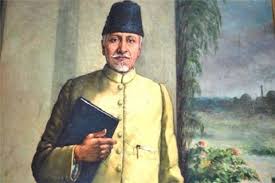
Who is the first education minister of India
Maulana Abul Kalam Azad – The First Education Minister of India
Who is the first education minister of India? Maulana Abul Kalam Azad was an early Education Minister in India. This article discusses his political career, some notable works, as well as an autobiography. It also describes his role and his legacy.
The first minister of education in India and his biography
Maulana Abul Kalam Azad an Indian freedom activist, scholar, and poet from India, served as the very first education minister in Independent India. He played an important role in shaping India’s education policy as well as laying the foundations for many institutions that still exist to this day.
Maulana Abul Kalam Azad, born 1888. He was the son of an Islamic scholar. The family traveled to Mecca around 1857. In 1898 the family returned home to Kolkata. In the year of Independence, Maulana Azad joined the Indian National Congress.
A major figure in the Indian struggle against the British. A key figure in the fight against the British, Maulana Abul Kalam Azad was elected one of the youngest members of Congress who was elected President in 1923. As President and presidency, he was the head of an extra Congress in September 1923. Congress during September of 1923. During this time as well, he participated in the Constituent Assembly and drafted the Indian constitution.
The Indian government named Maulana Azad to be the first education minister of Independent India. He was appointed in 1947 and was appointed over 15 months. In his time he initiated several initiatives to encourage research and science.
The Education System in India prior to Independence
Before the independence of 1947 Education in India was managed by the state governments. The primary goal of the states was to offer free education at the elementary and secondary levels for every child. However, there were some flaws.
There were also concerns about the instruction language. Persian was thought to be the language of the court. There was also discord between businessmen and teacher politicians and businessmen, which hindered the development.
In the 1830s Lord Thomas Babington Macaulay established a modern system of schools in India. He introduced Western educational opportunities to his entire nation. At the time, literacy rates were high..
British administration in India led to the need for a new educational system. Missionaries favored the spread of western education. However certain Indians prefer tradition. Indian system.
Following independence, the education system was separated between central and state governments. It was determined that all children would be enrolled in 5 years of formal education in the year 1990. This was an important step in making education a top priority in the country.
The new policies were introduced to tackle the problem that regional differences. Additionally the fact that more technical and vocational schools were created. This led to technology and scientific education progressing.
Education Minister of India
The minister of Education of India is responsible for the formulation and implementation of India’s national education policy. He is also responsible for overseeing educational activities across all levels. He makes sure that the education policy is effectively implemented and that all children have access to high-quality education.
The primary goal that the minister has is to expand the accessibility to education. It also encourages advancement and research in the educational area. Since independence, the government has been working for years to raise the standards of learning. The most important initiatives are upgrading the infrastructure of schools, improving online literacy, and promoting international cooperation in education.
The Indian government has also set out to improve the accessibility of educational opportunities to youngsters in the country. This initiative has increased the number of students enrolled by 28 percent. Additionally, The Industrial Training Institutes have increased the number of students they enroll by nearly 40%.
One of the most difficult issues in the field of education is the gap in achievement. This is the disparity in the academic performance of students from a family with a low income and one from a family of higher income. A gap in achievement has an enormous influence on a student’s eventual achievement.
Career and notable work
Maulana Abul Kalam Azad is an early pioneer in the area of education in India. In fact, Azad was the first education minister in independent India. The politician was also as well as also a writer. He made contributions to Indian society were numerous. One of his greatest contributions was the establishment of Jamia Millia Islamia University. The university is located in Aligarh, Uttar Pradesh, the school eventually relocated to Delhi. It is among India’s oldest institutions. India.
He was fluent in six different languages. He was a master of storytelling and was an expert in the writing of words. The prolific writer wrote a number of eloquent and engaging prose pieces. Some of his most memorable works include his poem, The Optimist which is a play inspired by the story The Odyssey by Ernest Hemingway, and his humorous work, A Tale of Two Cities.
There are numerous things he did in his lifetime and his work within the realm of educational research has stood in the midst of time. He established his institute, Jamila Milia Islamia, a higher education institute in the year 1920. Later, the institute was transformed into an institute of the Department of Education under Delhi University.
Political Career of Maulana Abul Kalam Azad
Maulana Abul Kalam Azad, the very first education minister from Independent India. He was also the head of Congress and was a freedom fighter. His birthday is observed in the form of National Education Day in India. In spite of his political affiliations, Maulana Azad was considered a secularist nationalist who believes in the right of all children to be educated.
He was a mathematician, in English, geometry, Persian, Arabic, and philosophy. His writings, published under the nickname “Azad,” gained great recognition. At the age of 11 years old, he was writing articles and poems.
Azad was a politician, who was elected to his seat in the Lok Sabha in the year 1957. He was in office for nine months. He is interred at Old Delhi near Jama Masjid.
In his life and travels, he visited many nations. He also established his own institute, Jamila Milia Islamia educational institution.
A leading figure in the Khilafat Movement, Azad fought to restore his father, the Ottoman Sultan to be the caliph of Islam. The year 1920 was when he declared India as a “Dar al Harb which translates to the ‘House of War.’ In the course of his work, He set up refugee camps throughout Punjab in Punjab and Bengal.
Role of Abul Kalam Azad
Maulana Abul Kalam Azad is one the first pioneers of India’s education system. He was a politician as well as a social educator. His work was crucial in the growth of the nation. As the first minister of education in independent India He played a significant role in the creation of an education policy that was national.
As the president of Congress, Abul Kalam Azad took on a number of initiatives to improve the nation’s education system. He advocated for the creation of an all-inclusive elementary education system for every child. This would help rural communities get access to education.
Abul Kalam also helped promote scientific research. He also established his own University Grants Commission, which is among the leading educational institutions in the country.
Even though the man was a Muslim however, he opposed the idea of partitioning India. He was a vocal advocate of Hindu-Muslim harmony. He believed that both communities must be able to live together within a democratic society.
He was a critic of the British government over its racial policies. He was arrested on multiple occasions. But, he was freed after the Gandhi-Irwin accord in 1931.
Pre-Independence Activities of Maulana Abul Kalam
Maulana Abul Kalam Azad was an extremely prominent leader in his time in the Indian liberation struggle. Azad was the first Minister of Education in Independent India. His contributions to the educational system of India are enormous. He was instrumental in establishing numerous colleges and universities across the country.
Additionally to that, he was also a poet. The first poem he wrote came out in 1899. Throughout his entire lifetime, he fought for the betterment of the nation. He was a vocal advocate for women’s rights, advanced studies in science and engineering as well as vocational education. One of his many achievements is that he was the first to establish Aligarh Muslim University. Aligarh Muslim University.
As a young man, Abul Kalam had naturally drawn to writing. He began writing poems and articles at a young age. In the end, he decided to launch his own newspaper every week called Al-Hilal. The publication gained a lot of popularity and helped in establishing an identity of Hindu-Muslim unification. It was outlawed by the British government in 1914.
Read More: THE HITEKS COMPANY TODAY APPOINTED JUDY CASSETTY
In his time as Education Minister, he rolled out various initiatives to encourage the advancement of education across the country. They included the establishment of India’s premier IIT along with the University Grants Commission. Additionally, he pushed for free education for all children.
Legacy of Abul Kalam Azad
Maulana Abul Kalam Azad, also known as Maulana a significant character in The Indian fight for freedom. He was a well-known national poet as well as an author, freedom fighter, and educator. His achievements are still being celebrated to this day.
Maulana Abul Kalam Azad was the first Minister of Education in Independent India from 1947 to 1958. He is well-known for his efforts to promote education in India. In his time in office, he fought for free education in primary school for all kids. He also promoted the development of science education as well as the creation of numerous universities.
As a young man, Abul Kalam Azad started writing poetry and writing articles. Also, he studied Persian in addition to Arabic. In his later years, He wrote under the pen name “Azad”.
As the head of the Indian National Congress, Abul Kalam Azad was an important person in the formulation and drafting of India’s constitution. India. He was also an ardent advocate of partitioning India. While in his presidency of India, he initiated a variety of initiatives, among them the establishment of the University Grants Commission and the creation of additional educational institutions.
He was a strong advocate of social policies that were socialist, economic reforms, as well as the idea of the ahimsa principle. Additionally, he was adamantly opposed to the concept of religious separatism in the community. The man believed India should strive to achieve high academic standards.
Also Read: Kotak Mahindra bank credit card tracking











